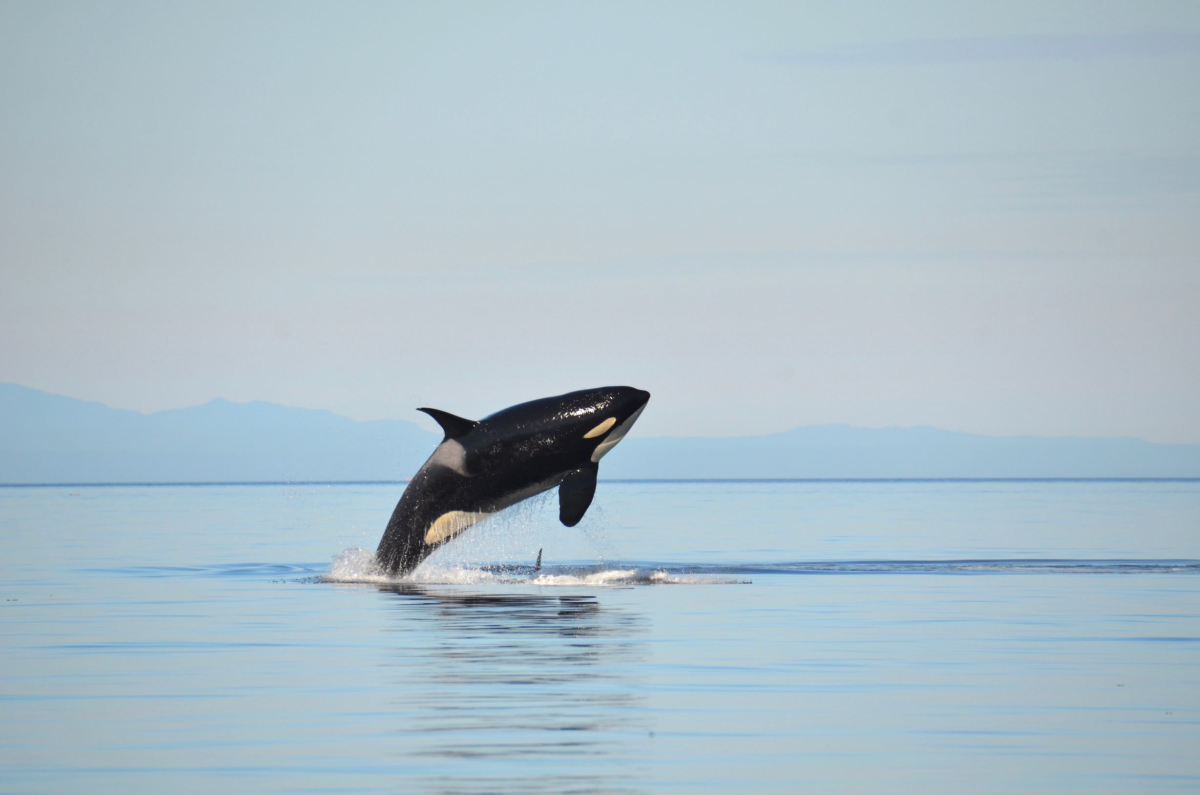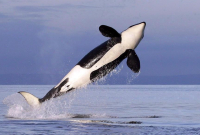Support strong Canadian climate journalism for 2025
David Osborne watched with joyful anticipation from his kitchen sink as a police boat intercepted a vessel that had crossed into an endangered whale sanctuary.
Looking out over Boundary Pass on July 13, near the eastern point of Saturna Island, B.C., the retired educator thought back to how he and his daughter had watched, alarmed, as boats blasted their way through the sanctuary for a month and a half, ignoring a federal interim order.
This is the second year that Transport Canada has banned most vessel activity around “key foraging areas” for the Southern Resident Killer Whales — endangered orcas that have seen their numbers dwindle to the low seventies.
Boaters can face fines or jail time under the Canada Shipping Act for breaching three sanctuary zones around Vancouver Island.
But by mid-August last year, officials admitted they hadn’t handed out any penalties to boaters caught skirting the rules. The government said it was focused more at the time on raising awareness.
Osborne became convinced that, this year, Canada would start to bring the hammer down. And for a while on that July day, he said it felt like the moment that things would change.
“Our initial reaction was joy — ‘Oh, finally, they’re pulling someone over. They’re going to give a ticket, this will be publicized, and then there will be some deterrence,’” he remembers thinking.
Then his excitement turned to disappointment as he watched the two boats part ways, with the suspect vessel heading back along the same course as before, straight into the sanctuary.
Prime Minister Justin Trudeau's government has touted the sanctuaries, in force this year from June 1 to Nov. 30, as a key part of its multi-pronged effort to protect the whales. The sanctuaries cover three areas near Saturna Island and Pender Island in the Gulf Islands, and a portion of Swiftsure Bank in Juan de Fuca Strait.
Island residents, however, say that boaters appear to be unaware of the rules, and are continuing to cross into the foraging areas, where the endangered orcas feed on salmon by echolocation.
Instead of getting tougher on those offenders by issuing fines, Canada is repeating its approach from last year, letting them off with verbal or written warnings.
As of Aug. 12, Transport Canada had not issued any fines or penalties to boaters caught violating the zones, Canada's National Observer has confirmed. The department says it is still deciding whether to pursue any of the incidents that it’s already heard about.
“Though there have been no administrative penalties or fines issued this year to date, we continue to follow up on reports of alleged violations to the interim sanctuary zones for potential enforcement actions,” said departmental senior communications advisor Sau Sau Liu.

‘To not enforce the law is just beyond the pale’
For Susie Washington-Smyth of the Saturna Sighting Network, a group of residents and research scientists who have been tracking nearby whales and boats, it’s a maddening problem.
“Our frustration is, why the hell are you creating these (sanctuary zones) if you’re not going to enforce?” she said.
“They’re a Band-Aid on a gunshot wound to begin with, in terms of being able to really help the orcas, but to not enforce the law is just beyond the pale. It’s insulting to the taxpayer, and it does nothing to protect the whales.”
As the department continues to weigh its options for enforcement, it has no shortage of reports to draw from. Two-thirds of the vessels Washington-Smyth’s group tracked in July were not in compliance with the Saturna sanctuary, she said.
The Saturna Sighting Network has partnered with the Saturna Island Marine Research and Education Society (SIMRES), a non-profit studying the sanctuary zones, in part to access its hydrophones in the water that can record the sounds that the whales and the boats are making.
The network and SIMRES also collaborate with Fisheries and Oceans Canada in order to agree on a methodology for organizing the data they are tracking. They also report the zone violations that they see to the department.
“We said, ‘OK, our role in this is that we will start a citizen science project, using the kind of rigour that is needed so that we can begin to get hard data on the distribution of whales, and their frequency,’” said Washington-Smyth.
During the period from July 6 to 18, her data showed that out of 104 vessels, 35 respected the zone, while 69 did not. The figures were collected from nine-to-five visual records confirmed by a rangefinder.
“What we have observed is that most of the boaters have no idea that there is a sanctuary zone,” she said. SIMRES president Martin Wale said he’s reached the same conclusion: “Most boaters have little awareness of the sanctuary zones.”
It’s not for a lack of resources. A presentation from Parks Canada, Transport Canada and Fisheries and Oceans Canada at the Saturna Island Cultural and Recreational Centre on Feb. 8, 2020, for example, outlined the “suite of tools” the government said it was using to enforce the sanctuaries.
These tools include aerial surveillance, and vessel tracking using transceivers. As well, three organizations — the RCMP’s marine unit, Parks Canada and Fisheries and Oceans Canada — have a sustained presence on the water, and Transport Canada says that all of them have been designated as enforcers of the interim order.
“Enforcement may not always be visible from shore, but enforcement actions are taking place,” the presentation assured residents.
Transport Canada’s own enforcement team, meanwhile, reviews alleged violation reports, and decides whether to follow up with boaters.
Under the Shipping Act, violators can be subject to a maximum of 18 months imprisonment upon summary conviction, a fine of up to $1 million or an administrative monetary penalty of up to $250,000.
Washington-Smyth said government officials had promised her in February that, this year, Canada was going to go beyond issuing warnings and actually issue fines.
Such monetary penalties are needed to create a true disincentive for boaters, she said; everything else is just “window dressing.”

‘We will not hesitate to issue a fine if it is warranted’
That’s not necessarily the case, said Michelle Sanders, director of clean water policy for Transport Canada.
Sanders has been one of the federal officials that Washington-Smyth and Saturna Island residents have been in contact with regarding the sanctuary zones. She informed an agitated Saturna Island crowd on Aug. 15, 2019, for example, that only verbal and written warnings had been issued by that time, according to a report in The Narwhal.
In an interview, Sanders argued that, far from letting people off the hook, receiving a warning from a law enforcement individual actually “gets your attention” as a boater. She said it makes people “very aware of what the rules are, and it helps inform the broader boating community.”
She also said the government remains committed to slapping boaters with penalties. “We will not hesitate to issue a fine if it is warranted. But we also need to ensure that they understand what the rules are,” Sanders said.
The government says it’s tracking the warnings they give out, and that all the boaters who have been caught so far have been first offenders. “We’ve not yet had a situation of a repeat non-compliance,” said Sanders.
When officers from one of the three agencies have approached boaters and asked them to leave the zones immediately, they do, she said. “I don’t think we’ve ever had an instance where they’re like, ‘Forget it, I’m staying here.’”
At the same time, Sanders said the government does not have a policy of letting first-time offenders off with a warning; it has simply worked out that way so far. “It completely depends on the circumstances,” she said.
Asked to specify what circumstances would have to be in play for a first-time offender to be issued a monetary penalty, Sanders said it would depend on other information that might be available.
“For example, if there are whales that are perhaps in the zone, that might be something that they would take into account, (or) if they have a history of non-compliance with other rules — this is information that our officers have,” she said.
An orca’s presence in the zone at the time of a boating infraction, however, should be beside the point, said SIMRES’s Wale. The zone is meant to protect the foraging area, a permanent fixture, rather than a transient orca.
“The reason the sanctuary zone is there in the first place is that this is a major foraging area for the Southern Resident Killer Whales. And that process of foraging — of feeding on salmon, by echolocation — is severely sensitive to disturbance and noise,” he said.
“The purpose of the sanctuary zone is to protect that feeding zone. So it’s not relevant whether the whales are there or not. The feeding zone needs to be protected, so that if the whales come, then they won’t be disturbed.”

Public awareness effort thwarted by COVID-19
In February, the government said it would apply “lessons learned” from the 2019 implementation of the sanctuary zones.
Officials said they realized they needed “increased and earlier communication” with boaters about the zones, and better collaboration with outside groups, U.S. officials, and participation at events such as boat shows.
“One of the biggest things we learned from last year was the importance of getting out in person and talking to people at the marinas, at the boat shows, because it’s such a diverse community that there’s no one way we can actually get to all the recreational boaters to make sure they understand,” Sanders said.
“We had put in place a pretty robust outreach plan that would include a lot of in-person outreach — meeting with local community groups, doing dock walks, going to the marinas, making presentations at boat shows.”
Those efforts were thwarted by the COVID-19 pandemic, she said. Bureaucrats were required to work from home. Boat shows were cancelled. Officials couldn’t be sent out on ferries due to public health measures. Basic person-to-person interaction became impossible.
“As you can appreciate, those are the things that were not able to be done as a result of the pandemic ... so we shifted to a virtual and online approach as best we could.”
The virtual approach meant things such as email engagement, and connecting with tourism organizations and visitor centres remotely. Sanders said it was not as robust an approach as they would have liked to have taken.
Still, by the end of June, B.C. had moved into the third phase of its COVID-19 reopening plan, encouraging residents to resume non-essential travel throughout the province.
Washington-Smyth said the government had promised that communication materials — such as posters and billboards for docks, marinas and ferries, and brochures for stores, cabins or bed-and-breakfasts — warning boaters of the sanctuary zones would be forthcoming.
On Aug. 17, Washington-Smyth said she was told by a Canada Parks official on Saturna Island that they still did not have any brochures or other written information from Transport Canada on the sanctuary zone to hand out.
“It’s now mid-August, and the interim order was in effect June 1,” she said. “It speaks to my point.”
Carl Meyer / Local Journalism Initiative / Canada’s National Observer






Comments
"Washington-Smyth said the government had promised that communication materials — such as posters and billboards for docks, marinas and ferries, and brochures for stores, cabins or bed-and-breakfasts — warning boaters of the sanctuary zones would be forthcoming.
On Aug. 17, Washington-Smyth said she was told by a Canada Parks official on Saturna Island that they still did not have any brochures or other written information from Transport Canada on the sanctuary zone to hand out. "
HUGE FAIL AS USUAL TO AN ENDANGERED SPECIES
Covid - 19 has been the all purpose, get out of jail free card for North American bureaucrats who have signally failed to deliver the services for which they are still being paid, or if not being paid, are simply slacking off The bureaucratic "confusion" has covered such a multitude of sins it is a wonder that there is anything like a functioning government in operation anywhere. However, the forms of government we would happily dispense with, trigger happy, bigoted law enforcement officers seem perfectly capable of carrying out their vigilante actions against unarmed, marginalized people - the people the white supremacy has been fighting to suppress for 4 centuries, the people they stole from homes in Africa, to enslave in concentration camps throughout the brave new world. The indigenous inhabitants they deliberately infected with the plague of smallpox, the people they massacred without mercy.... The holocaust that never ends. THAT law enforcement barrels along, with no let or hindrance Meanwhile the unarmed Salish Sea Orcas die of starvation and from ship strikes and only God knows what other kinds of malice inflicted on them by people, mostly white, who call themselves fisher folk or "sailors" but who are really naught but pirates.
Great article Carl. Thanks. Warnings on an offence impacting a endangered species is completely unacceptable. If you want to do a follow up article you might ask to see Transport Canada's enforcement and compliance policy and criteria used. And, I keep wondering who in Ottawa has decided only warnings? The Minister? Ottawa based Director or ADM?
Allowing first offenders off the hook (all of them) declares that at least one entry is allowed or in other words the rules mean nothing.